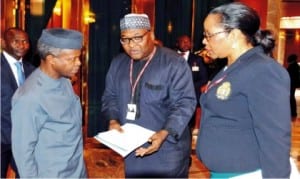Business
Shareholders Want Appropriate Sanctions Against Erring Stockbrokers

L-R: Vice President Yemi Osinbajo; Executive Secretary, Nigerian Shippers Council, Mr Hassan Bello and Director, Legal Services, Federal Ministry of Transport, Mrs Uche Okoro, after briefing President Muhammadu Buhari on activities of the Ministry and its agencies at the Presidential Villa in Abuja recently.
Some shareholders have
said that the burden on the Investors Protection Fund (IPF) would be stemmed by the levying of appropriate sanctions on erring stockbrokers caught engaging in sharp practices.
They said that their advocacy became imperative following the Securities and Exchange Commission (SEC) and the Nigerian Stock Exchange (NSE’s) commitment in restoring market-based confidence through the IPF.
The shareholders also said in interviews with newsmen in Lagos that the market regulators should expose erring dealers engaged in sharp practices to boost investors’ confidence.
The shareholders were reacting to the N43.23 million IPF monies paid to 158 investors as a result of defalcation committed by 29 dealing member firms.
The National Secretary, Independent Shareholders Association of Nigeria (ISAN), Mr Adebayo Adeleke, said that market regulators should prosecute erring brokers, to reduce malpractice in the market.
Adeleke said that stockbrokers were responsible for the losses incurred by investors and should be punished for such.
He said that the regulators should embrace the name and shame approach, to minimise fraudulent practices at the nation’s bourse.
National President, Progressive Shareholders Association of Nigeria (PSAN), Mr Boniface Okezie, called for transparency in the management of the fund.
Okezie said that the exchange should make public the names of the beneficiaries, for transparency and for investors to believe in it.
“As for now, the investment protection fund still remains a mystery because nobody is aware of it and the processes involved.
The investing public has to know who and who benefitted so far from the fund; it is not enough to say we have been paid so much, without letting the investing public know what is really going on at the committee level,’’ Okezie said.
He said that shareholders needed to be carried along in decision making by the NSE and its management.
The NSE on August 5 announced plans to compensate 158 investors with N42.23 million, under its IPF.
The IPF is a quasi-capital market insurance scheme inaugurated in 2012 for defalcation committed by the NSE-registered dealing member firms.
The fund was also designed to compensate investors’ loses occasioned by bankruptcy, insolvency, negligence or wrongdoing of the stock-broking firms and to boost investors’ confidence in the nation’s bourse.
Business
Fidelity Bank To Empower Women With Sustainable Entrepreneurship Skills, HAP2.0
Business
President Tinubu Approves Extension Ban On Raw Shea Nut Export
Business
Crisis Response: EU-project Delivers New Vet. Clinic To Katsina Govt.
-

 News3 days ago
News3 days agoAmend Constitution To Accommodate State Police, Tinubu Tells Senators
-

 Politics3 days ago
Politics3 days agoSenate Urges Tinubu To Sack CAC Boss
-

 News3 days ago
News3 days agoDisu Takes Over As New IGP …Declares Total War On Corruption, Impunity
-
Business3 days ago
President Tinubu Extends Raw Shea Nuts Export Ban To 2027
-
Business3 days ago
Crisis Response: EU-project Delivers New Vet. Clinic To Katsina Govt.
-
Business3 days ago
President Tinubu Approves Extension Ban On Raw Shea Nut Export
-
Sports3 days ago
NDG: Rivers Coach Appeal To NDDC In Talent Discovery
-
Rivers3 days ago
Etche Clan Urges Govt On Chieftaincy Recognition

